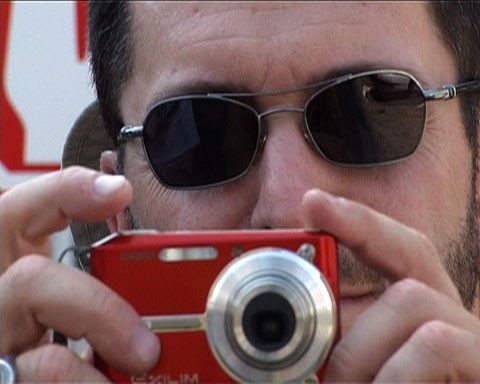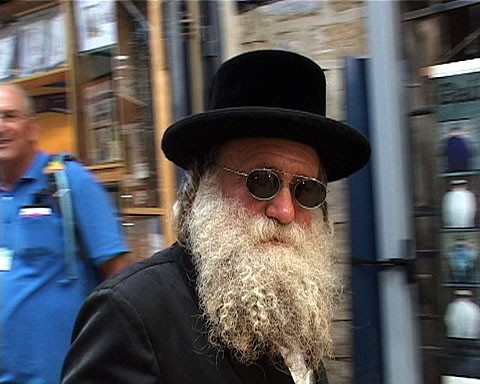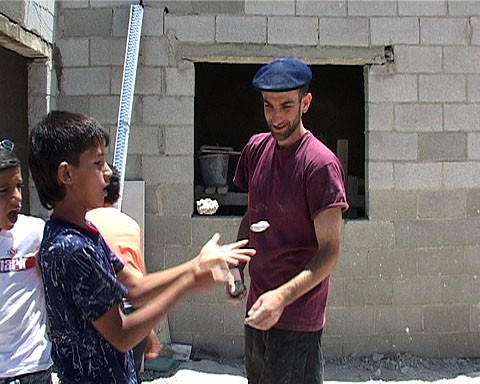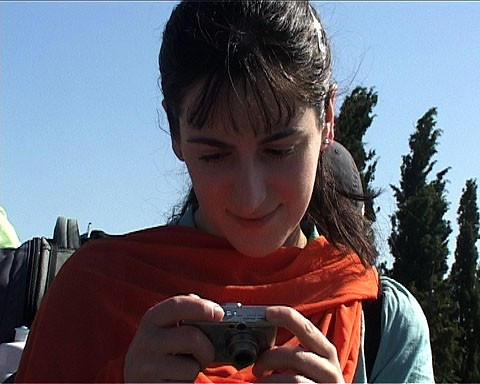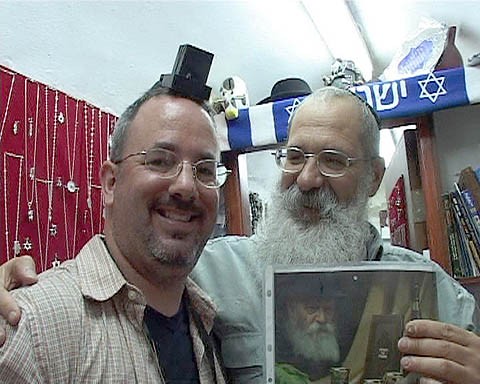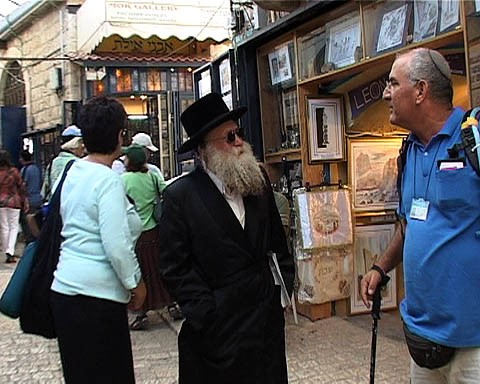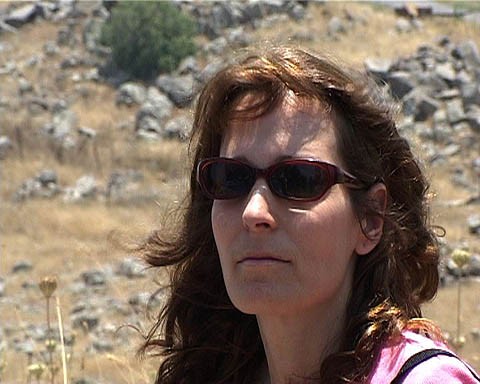Six decades after the founding of the Jewish State, when cherished historical memories collide with complex realities, how do you build your own individual relationship to Israel? In order to explore this timely question, Paula Weiman-Kelman spent more than a year following a wide range of American Jews, first-timers and frequent visitors, on their journeys to Israel. The result is Eyes Wide Open - a warm and personal film that vividly conveys the joys and ambivalences that inevitably characterize the deep emotional connection between American Jews and the Jewish homeland. Eyes Wide Open succeeds in lifting the spirit while raising important questions. Shot in Israel and the U.S., in synagogues and airports, at ancient landmarks and modern war zones, the film captures the spontaneous reactions of its ensemble of characters. The visitors represent a spectrum of American Jewry: Orthodox, traditional, and secular, male and female, young and old, liberal and conservative. What emerges is an honest and moving collective portrait, graced with visual beauty and spiced with humor. Eyes Wide Open challenges the viewer to reflect upon one's own relationship to Israel, and to begin a fresh conversation.
Synopsis
Six decades after the founding of the Jewish State, when cherished historical memories collide with complex realities, how do you build your own individual relationship to Israel? In order to explore this timely question, Paula Weiman-Kelman spent more than a year following a wide range of American Jews, first-timers and frequent visitors, on their journeys to Israel. The result is Eyes Wide Open - a warm and personal film that vividly conveys the joys and ambivalences that inevitably characterize the deep emotional connection between American Jews and the Jewish homeland. Eyes Wide Open succeeds in lifting the spirit while raising important...
Festivals
- Congregation Tikvat Jacob, 2010
- Temple Israel Center, NY, 2010
- Detroit Jewish Film Festival, USA, 2010
- Milwaukee JCC, USA, 2009
Press & Links:
DASH magazine
The Jerusalem Post, February 2009Israel Without Blinders, Jenna Hanson
[excepts]
Filmmaker Paula Weiman-Kelman believes that if you think Israel is perfect and you want it to be perfect, then you don't have a real relationship with the
country.
…Jonathan Lopatin our producer was frustrated because his friends who loved Israel didn't criticize it, while his friends who criticized Israel didn't love
it. So he had this idea of making a film that would follow people who visit here….the film shows that, while many American Jews are enthralled by Israel,
many also experience great inner confusion about the complex realities of Israeli life. To add to the complexity, the Second Lebanon War broke out in the
middle of filming…"Real life gave us the arc on which to construct the story" continues Paula. .."I have watched the film hundreds of times and I have become
so attached to the people in it because they are so genuine in their views; in some way, I feel like it's a self portrait, reflecting my own inner
contradictions. Every character voices something I myself thought at one time or another during my life in Israel".
" Paula Weiman-Kelman's EYES WIDE OPEN, a film about the relationship between American Jews and Israel. It really goes from the spectrum of left to right. If you wanted to see the American Jewish experience on the 60th anniversary of the state of Israel, this is the film to see."Nancy Fishman – Program Director- The San Francisco Jewish Film Festival
"I am very excited about the opportunity to screen your film, Eyes Wide Open, at the JMM on 11/16/08 especially in light of the fact that one of our galleries has the beautiful exhibit, Dateline: Israel: New Photography and Video Art and your film is a wonderful complement to the exhibit."
Ilene Dackman-Alon, Program Director, Jewish Museum of Marylan
"While making the documentary “Eyes Wide Open,” filmmaker Paula Weiman-Kelman spent more than a year following a broad range of American Jews as they sojourned though Israel on Birthright, research trips, and missions for synagogues, educators and gay and lesbians. At each turn, American Jews are
interviewed about their feelings on the Jewish state, exploring both their support for Israel’s flourishing and their dismay at some of its policies. Together, the interviews and the film show the complex relationships many American Jews have with Israel."
For the entire review by Carolyn Slutsky, check: http://www.thejewishweek.com/viewArticle/c36_a13111/News/New_York.html
"In a new documentary film about the emotional journeys of American Jewish visitors to Israel, a young woman named Caryn Aviv takes a tour of the West Bank security fence. As the camera pans across a line of graffiti on the wall that reads "From the Warsaw Ghetto to Abu Dis Ghetto," Aviv says she is troubled and perplexed. "I see a lot of injustice here," she said in the film, "Eyes Wide Open."
For the entire article by Dina Kraft, click here"Paula Weiman-Kelman’s engaging documentary follows American Jewish tourists visiting Israel in 2006 during the tumultuous summer of the Second Lebanon War. Diverse experiences emerge: One young woman watching missiles fall chokes up about Israeli youth drafted as soldiers; a man fearfully leaves the country soon after arriving. Interviews portray various outlooks regarding religion, government policies and relationship to the land. "Sara Trappler Spielman, Hadassah Magazine, June, 2007
Eyes Wide Open on BBC Blog: http://news.bbc.co.uk/1/hi/world/middle_east/7383772.stm,
Tim Franks, May 5, 2008
"Eyes Wide Open, a documentary film that takes a close and candid look at the preconceptions and revelations of American Jews who visit Israel, premiers in Israel at the Jerusalem Cinemateque on Thursday, February 28th, 2008."
For the entire review, check Brad Burge's blog:http://jesusraptureme.blogspot.com/2008/02/candid-look-at-us-jews-relations-with.html
"A new documentary called Eyes Wide Open is getting rave reviews for its thoughtful and evocative treatment of this issue. Directed by Jerusalem-based filmmaker Paula Weiman-Kelman, Eyes Wide Open follows a handful of American visitors to Israel: A birthright group, a New Israel Fund mission, two Americans working for Palestinian rights, a delegation from New York's Bnai Jeshurun synagogue, and a lesbian couple—and tries to explore their feelings and thought processes as they struggle with the reality they see in Israel, and their often contradictory liberal leanings."
For the entire review by Tamar Fox, check: http://www.jewcy.com/post/new_documentary_explores_american_jews_feelings_israel
"EYES WIDE OPEN a 60-minute look at the story behind the tour buses that often clog the streets of the capital, interviews first-timers as well as more seasoned tourists. What emerges is a story about the inspiration, as well as some of the emotional challenges, that Israel poses to American Jewry."
For the entire review by Daphna Berman, Haaretz.com, check: http://www.haaretz.com/hasen/spages/958926.html
Full Articles:
Film explores Israel-Diaspora gap
A film about the relationship American Jews have with Israel is prompting soul searching about the Israel-Diaspora divide.
TEL AVIV (JTA) -- In a new documentary film about the emotional journeys of American Jewish visitors to Israel, a young woman named Caryn Aviv takes a tour of the West Bank security fence.
As the camera pans across a line of graffiti on the wall that reads "From the Warsaw Ghetto to Abu Dis Ghetto,” Aviv says she is troubled and perplexed.
"I see a lot of injustice here," she said in the film, “Eyes Wide Open.” Following a recent screening in Jerusalem, an American who immigrated to Israel in the 1970s stood at a post-film discussion and asked when, exactly, Israelis and American Jews began to drift apart. American Jews today have “a fear to commit to Israel," she said. "That is something we did not have."
The film casts a spotlight on the often painful question of whether American Jews, who represent the Diaspora’s largest community, are feeling increasingly disconnected from Israel, and if so, why. If discussions surrounding the film are any gauge, it's also prompting some soul searching about the Israel-Diaspora gap. "There is a major gap that is growing etween American Jews and Israelis," said Yoram Peri, head of the Chaim Herzog Institute for Media, Politics and Society at Tel Aviv University, speaking after the film’s Jerusalem debut. Like many Israelis, Peri attributes the growing disconnect to the divergent ways Israelis and American Jews view the Jewish state. Whereas many American Jews have an idealistic view of Israel and high moral expectations for its behavior, Israelis see their home in what they see as more realistic terms: an embattled country muddling its way forward, warts and all. They see our existence and look for a moral, religious and emotionally deep identity, and are less sensitive to our existential issues,” Peri said of American Jews. “We look at the country as a physical place and less as a spiritual place.”
The statistics show a worrying trend, particularly among younger American Jews, of less emotional attachment to Israel. A study published last year by the Andrea and Charles Bronfman Philanthropies found that 48 percent of non-Orthodox respondents under the age of 35 agreed that "Israel's destruction would be a personal tragedy" and 54 percent were "comfortable with the idea of a Jewish state." In the 2001 U.S. National Jewish Population Survey, 52 percent of those under age 35 said they felt either very or somewhat emotionally attached to Israel.Dina Kraft, JTA, June, 2008
Epoch Times – Online site, March 18, 2008
Armed with Glasses
One person looks at everything in an optimistic light/ That’s not good, they say, it’s even pretty bad/ Another looks at everything in a gloomy light/ It’s another form of the same disease/ Don’t wear glasses- either happy or gloomy ones/ Look at everything with eyes wide open.
Eyes Wide Open opens with these words from Nathan Alterman’s song “Armed with Glasses,” sung by Erik Einstein , with music composed by Miki Gavrielov. The Israeli premiere took place on February 28 at the Jerusalem Cinematheque, a month after the world premiere in New York. This film is as Israeli as it comes. Even though, the movie focuses almost entirely on American Jews. This contradiction highlights the great love, longing and deep sense of identity that American Jews feel toward Israel.
The film producers, director Paula Weiman-Kelman, scriptwriter Stuart Schoffman and producer Jon Lopatin undertook a courageous and difficult project: how could they express an objective opinion on Israel’s policy in the territories and the Israeli-Arab conflict, without sounding opposed, cowardly or revolutionary? The solution is a brilliant one -- to do so through the mouths of others. The movie has almost no narration – it is composed almost entirely of spontaneous interviews with American Jews vacationing in Israel. Director Paula Weiman- Kelman follows them with her camera and interviews a wide spectrum of American Jews -- from religious Jews of Brooklyn to lesbians, to every-day grandmothers.
The genius of the film stems from the ability of Paula Weiman-Kelman to identify and capture those very Israeli moments that we all are so familiar with., and present them from a different angle: through the eyes of American tourists. Things we have so gotten used to, that we hardly notice anymore. A katyusha rocket falling in the north or before-Shabbat shopping are transformed, through American eyes, into moving, larger than life episodes.
An especially amusing scene that evoked thunderous laughter from the audience shows an American tourist who runs into a religious Jew who tries to convince him to put on tefilim. There are very few Israelis who have not had the same experience. Of course in the end the American tourist happily puts on the tefilim as is becoming for a good Jew that respects his religion.
However, in spite of Zionism and a deep affinity with the Land of Israel, even Americans have their doubts, One of the scenes focuses on a young girl that participates in a demonstration against the security fence separating East and West Jerusalem. The ultimate question is raised again here: how can the people of Israel, who survived the Holocaust, treat the Palestinians this way?
The film maintains a balance and makes sure to present voices from both sides. An American tourist in his 60’s explains that the State of Israel cannot exist without severe security measures to protect it from its neighbors.
The film, which is about one hour long, is entertaining and light-hearted, but at the same time also thought-provoking. It raises questions we perhaps never wanted to confront. Both we Israelis as well American Jews were educated on the myth of “the righteous and heroic Israel standing steadfast against the armies of our cruel enemies that surround us on all sides.” And here comes this film and tells us : “Stop Let’s look around. What exactly is happening here?”
http://www.epochtimes.co.il/news/content/view/8447/89/
Brothers, Strangers The relationship between American Jews and Israel is always a fascinating subject, one that Israelis don’t think about enough. The film Eyes Wide Open can perhaps shed light on at least one aspect of this vast topic. This is a documentary made by three Jews who live on the seam line between Israel and the English-speaking Diaspora. Paula Weiman-Kelman, the director, is Israeli and a Jerusalemite, but her accent leaves no room for doubt. Jon Lopatin, the producer, is a major American businessman who retired early and devotes his time and money to activities promoting the issue of Jewish identity. The film accompanies American Jews who come on their first visit to Israel – both young and elderly, and from different missions – and attempts to examine the nature of this encounter, which turns out to be more complicated than one would think.
“American Jews grow up on the myth, or archetype, of Israel,” explains Lopatin before the screening,” and someone who comes for the first time is both shocked and amazed. There is a double process going on: on one hand, their original, na?ve perceptions are weakened, and complexity sets in, and on the other hand, or maybe as part of the first process, this actually becomes more of an attraction for them. I am speaking about myself: the years pass and I find myself coming here more and more frequently, even though I am connected to what is going on here in a more multi-faceted way.
The film documents – and this is its weakness –- mainly liberal Jews who come here, who in Israel would automatically be categorized as left-wing. In the only political moments in the film, the camera accompanies a young girl who joins a “non-violent” demonstration by the residents of Beit Sira against the security fence, and another young man participates in the rebuilding of a house that was destroyed by the authorities in the village of Anata. Even for the other participants in the film, who would probably not take part in activities of this kind, Israel is a reality which is hard to swallow and digest. “Just as no one asks you if you want to be identified as a Jew,” says one woman, who later in the film proposes marriage to her lesbian girlfriend in Jerusalem, “no one asks you if you want to be identified with Israel.
That is how you are identified, if you like it or not. And if that is the reality, I wanted to come and see it with my own eyes, and understand what this thing is that I am connected to.”In a panel discussion that took place after the screening NIF’s Eliezer Yaari remarked that its about time American Jews stop treating Israel as something they have to give their opinion on, or even grade. And this is a significant statement. For some reason, Jews who come to visit feel the need to compare it all the time to their expectations. Someone apparently promised them an ideal model of a Jewish State, and they, to some extent, come over to check whether the project succeeded. Others spoke about the need for Israelis to accept their brother overseas with more openness. In light of this very true statement, I would recommend this film to a lot of non-liberal Jews, like me, if only to understand that Israel is and will continue to be a point of identification, not only for many Jews like me, but for many distant Jews also. Even the girl who went to demonstrate side-by-side with Palestinians is moved by the preparations for the Sabbath in Jerusalem and feels a deep connection to the country.
Watching the film also teaches us to what extent the eyes that watch Israel through the window of the bus, the lens of the camera or the explanations of the tour guide come from a completely different world, and that they also remain there. The deep imprint of American culture creates a mental barrier between Jews of the Diaspora and Israeli Jews. The visitors are first and foremost Americans, then they are Jews and by virtue of that they have a powerfully emotional and existential connection to what is happening here.
The interviewees, who all come from different backgrounds, all get to the same conclusion: the encounter with Israel is powerful and earth shattering—with the Israel which has a dominant Jewish presence, with the Israel that is a sovereign Jewish state, and also with the Israel in which you come face to face with the remnants of biblical times. The visitor who was raised on the myth suddenly finds out that Jerusalem is really on earth, it’s a city just like any other, and that life as a minority in a non-Jewish society is not the only Jewish alternative. This film provides for Israelis, as well as na?ve and simple Americans, a chance to look again at this wonderful country we live in, and to see that the rifts that tear us apart are smaller than we thought. It turns out that we are all first and foremost Israelis, Jews that chose to live in their country -- a choice that made us very different from our brothers over there.
Yoav Sorek/Makor Rishon, March 21, 2008
Kol Hazman, March 7, 2008Birthright at the bottom
By Maya Eldar
Eyes Wide Open provides a lot of food for thought regarding American Jews and ourselves.
The south is being bombed, Gaza is on fire, people are demonstrating in the streets and everyone has an agenda they would like to discuss with whoever will lend an ear. In the midst of this chaos, which looks like it will never end, Jerusalem temporarily turned into an island of sanity(don’t get enthusiastic, everything is possible here). During these sane moments, I found myself going to the Israeli premiere of Eyes Wide Open written by Stuart Schoffman and directed by Paula Weiman-Kelman. A quick glance at the invitation proved that this wasn’t for laughs: this was a serious movie that set out to examine some unsolved issues and explore the prejudices and insights of American Jews visiting Israel.
The Cinematheque’s main hall was filled to the brim, mainly with English speakers, probably because the film, the reception, the speeches and panel discussion following were all in English, which is my mother tongue but certainly not the local language. Greetings were presented by Lia Van Leer, who honored us with her presence and remarked how happy she was to be there. Ilan De Vries, General Director of the Cinematheque, said a few words about “the complex relationship between American Jews and Israel, especially in recent years.” After that, the screening began and in the background we heard Nathan Alterman’s song Siyum in the popular version sung by Arik Einstein “Don’t wear glasses, sad or happy – look with eyes wide open.” After that, we saw archive footage of the November 29 vote and the dancing in the streets of the city.
The camera moves suddenly to 2006, to a birthright group traveling from New York to Israel, and we see the Americans’ deliberating whether to come to Israel or not, why to come, why not to come, etc. The interviewees have everything; they really lack nothing, but they are expressing a desire to connect to the Jew within themselves, and it seems they are lacking one of the ingredients in the recipe of personal and individual wholeness, an ingredient that seems to exist only in the Holy Land. The brave and beautiful get on the plane for a few weeks of joyful intoxication, which includes sightseeing at the pace of an Energizer bunny, tree-planting, eating in the markets, Kabbalat Shabbat ceremonies, and if possible, volunteer work in the community.
The camera follows American young women that came to demonstrate against the Security Fence, to protest the injustices and to support the stranded Palestinians. They have the right to. The very candid script cause many locals in the room to move nervously in their chairs, because, for crying out loud, who are you to go on about the situation, when you have no clue as to what is going on here? Then we went on to another person who made a direct comparison between Europe sixty years ago and Israel today. She was joined by some other people who said they really don’t understand why Israel needs a strong army, and I was personally blown away by the tourist that said that we really don’t need the State of Israel. Comic relief came in the form of an American Jew that hasn’t visited Israel for years, and the moment he landed, the Second Lebanese War broke out. As a result of his indecision and fears, he took a plane back home before he managed to fulfill most of his goals.
It was disturbing to see and think about the absolute rift between Jews living in Israel and American Jews. R’, a veteran immigrant to Israel, who became aware of the rash I was developing, tried to comfort me by saying that those that participated in the film are those that still take an interest and support in some way, in comparison to the huge, silent numbers that do not come, do not support and certainly do not put a quarter in the Keren Kayemet boxes.
Following the screening, Weiman-Kelman thanked everyone, especially producer Jon Lopatin, and said “I tried to understand the fundamental connection between American Jews and Israel, and what American Jews expect from this relationship. During the process, I made this film, in the hope that it will serve as a springboard for a candid and open discussion about the emotional and social bond between American Jews and Israel.
For dessert, there was a respectable panel, including Colette Avital, who spoke about the alienation and rift between the two communities; Eliezer Yaari, who said that “in this dialogue, we shouldn’t have to justify ourselves all the time; Yossi Klein Halevi observed that “60 years after the Holocaust, there are Jews who are uncomfortable with strength.” And scriptwriter Schoffman stressed that “Israel is the ultimate text that has no substitute” A lot of questions. No answers. Maybe in the next film.
Eyes Wide Open, Israeli premiere, Cinematheque, Thursday February 28, 2008.
Festivals
- Congregation Tikvat Jacob, 2010
- Temple Israel Center, NY, 2010
- Detroit Jewish Film Festival, USA, 2010
- Milwaukee JCC, USA, 2009
- Jewish Eye Film Festival, Ashkelon, Israel, 2009
- Germantown JCC Film Series, Philadelphia, USA, 2009
- Beth El Synagogue, New Rochelle N.Y., USA, 2008
- Cherry Hill Volvo Jewish Film Festival, USA, 2009
- Rhode Island Israeli Mini Series, USA, 2009
- Temple Sholom, NJ, NY 2009
- Austin Jewish Film Festival, USA, 2009
- Kehilath Jeshurun Congregation, NY, USA, 2008
- Maryland Jewish Museum, USA, 2008
- Adath Jeshurun Congregation, Minnesota, USA, 2008
- New Israel Fund, UK
- Tel Aviv Cinematheque
- Temple Sinai, LA, USA
- American Film Institute, Washington, USA, 2008
- 92 Y, NYC, USA, 2008
- Joseph Slifka Jewish Center, Yale, USA
- Bina Secular Yeshiva, Israel, 2008
- Hillel at Columbia University
- San Francisco Jewish Film Festival, USA, 2008
- Manhattan JCC, USA, 2008
- Jerusalem Cinematheque, Israel, 2008
- Broward County Jewish Federation, USA, 2008
- Rodeph Sholom Congregation, NY, 2008
Educational
- Brandeis University
- McMaster University Library
- University of Texas at Austin
- Baltimore Center for Jewish Education
- University of South Florida
- Resource Center for Jewish Education
- Ohio State University
- UCLA
- BJE Library
- J Street, Washington, USA
- Coleman Summer Camp, Georgia
- Crane Lake Summer Camp, MA
- Eisner Summer Camp, Ma
- George Summer Camp, Canada
- Guci Summer Camp, Indiana
- Green Family Summer Camp, Texas
- Harlam Summer Camp, PA
- Jacobs Summer Camp, Mississippi
- Kutz Summer Camp, NY
- Kalsman Summer Camp, WA
- Newman Summer Camp, Canada
- ORSUI Summer Camp, WI
- URJ Camps, USA
- Ithaca College
- Arizona State University
- Library of Congress
- Conservative Rabbis Annual Conference, Israel
- Center for Leadership Initiatives, NY
- Princeton University
- Columbia University
- University of Pennsylvania
- AJS Conference, 2008
- George Washington University
- CAJE Conference, 2008
- University of Washington, USA
- Yale University
- Harvard University
- Duke University, USA
- Denver University, USAl
- Yavneh Camp, USA
- Hebrew University, Israel
- Hebrew Union College, Israel
- Bina Secular Yeshiva, Israel
- Hillel at Columbia University
- Slifka Jewish Center at Yale University
- Akiva High School, Cleveland, USA, 2008
- Mandel Leadership Institute, Israel, 2008
- Library of Greater New Haven JCC, USA, 2008
